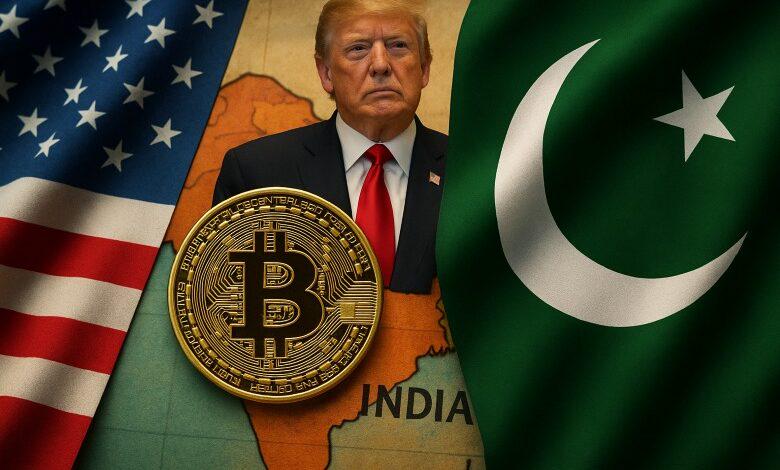Author: Walid Abou Zaki
Translator: BlockWeeks
When President Trump praised Pakistan over India, it was not just a political stunt but marked a deeper strategic shift. Islamabad is integrating cryptocurrency and digital asset policies into the framework of energy, trade, governance, and diplomatic relations. The results are reflected in: a surge in U.S. favorability, increased global attention, and a shift in the power dynamics of South Asia.

Foundational Path - Long Before the Headlines
Pakistan's journey in blockchain and digital assets did not begin in 2025; its seeds were sown long ago:
March 2023: The Avanza Group announced the launch of the country's first blockchain-based national eKYC platform, enhancing compliance and digital identity infrastructure;
December 2023: Invoicemate completed a private credit pilot on the XDC network, showcasing the role of blockchain in SME financing and trade digitization.
These milestones laid the groundwork for subsequent national ambitions.
From Framework to National Strategy
In the past eight months, Pakistan has moved from pilot projects to policy formulation:
The 2025 Virtual Assets Ordinance: Established the legal foundation for the Pakistan Virtual Assets Regulatory Authority (PVARA), granting it licensing and regulatory authority over crypto service providers;
Central Bank Digital Currency Pilot: The State Bank of Pakistan initiated a digital currency experiment, aiming for completion within the current fiscal year;
Pakistan Crypto Committee (PCC): Established in March 2025, chaired by the Finance Minister, with Bilal Bin Saqib as CEO; Binance founder CZ serves as a strategic advisor;
Energy-to-Computing Power Strategy: Redirecting 2000 megawatts of surplus electricity to Bitcoin mining and AI data centers, supported by sovereign strategic Bitcoin reserves. This could attract regional miners (especially from the Gulf) to shift capacity to Pakistan. With the UAE's Phoenix Group positioning itself as a global player in mining and computing infrastructure, whether Pakistan's tariff incentives and surplus energy will attract such operators is a focal point;
Pakistan Digital Authority (PDA): Responsible for coordinating national digital transformation, streamlining identity verification, and nurturing a state-supported digital economy;
WLFI and PCC Memorandum of Understanding (April 2025): The Trump-associated DeFi platform World Liberty Financial (WLFI) signed an agreement with the Pakistan Crypto Committee to promote the implementation of blockchain and DeFi, stablecoin settlement frameworks (such as tokenization and asset-backed channels), and regulatory sandbox frameworks. Previously, WLFI's founder had a high-profile meeting with CZ in Abu Dhabi, highlighting the expansion of Pakistan's global crypto alliance.
These steps are not just regulatory but also serve as institutional infrastructure supporting economic and geopolitical strategies.
Washington's Deliberate Openness
The U.S. has shown a friendlier stance towards Islamabad than New Delhi:
Tariff Reductions for Pakistan: New trade agreements lower tariffs on textiles, IT, and agricultural products, and open up cooperation on oil reserves and digital assets;
Increased Tariffs on India: In contrast, Washington has imposed a 25% tariff on Indian goods since August 7, set to rise to 50% by the end of August, punishing its discounted purchases of Russian oil.
Pakistan's tariff rate is about 19%, significantly lower than India's, making it a more favored export destination in Asia. This reflects Washington's policy orientation of "rewarding alliances and punishing independence."
India's Hesitation
India remains a South Asian economic powerhouse, but its crypto policy is characterized by high taxes, strict regulations, and a focus on speculation rather than strategic infrastructure. Despite promoting local innovations like UPI and ONDC, it has not integrated crypto assets into its strategic framework. The contrast is stark: Pakistan aligns its crypto policy with U.S. priorities and builds new alliances, while India remains in "theoretical discussions."
India's Resistance and Rising Costs
India's pursuit of strategic autonomy is leading to consequences:
The new U.S. tariffs are expected to reduce its GDP by 0.3%-0.6%;
Continued alignment with Russia and a multipolar economic model have strained relations with the U.S. and unsettled Quad partners.
In contrast, Pakistan's rapid regulatory advancements and geopolitical alignment make it a more accessible and attractive partner.
Prospects for Pakistan's Gains
Capital Attraction: A clear regulatory framework and global advisors make it a center for exchanges, custody, and tokenization innovations;
Energy Monetization: Utilizing surplus electricity for Bitcoin mining and AI computing transforms energy liabilities into revenue-generating assets;
Remittance and Trade Innovations: CBDC pilots and licensing frameworks support stablecoin settlements, reducing costs for millions;
Diplomatic Leverage: Crypto policy becomes a diplomatic tool, strengthening Pakistan's negotiating power with Washington.
The Geopoliticization of Cryptocurrency
This shift is not just a financial strategy but a geopolitical maneuver. By rewarding Pakistan for its cooperation, Trump simultaneously pressures India regarding its independent tendencies—especially concerning discounted oil transactions with Russia and attempts at de-dollarization. Cryptocurrency serves both symbolic and practical functions in this balancing act.
Pakistan's willingness to integrate digital assets into its national strategy has earned it space and favor, while India's hesitation exposes it to tariffs and pressure. The question remains: will Pakistan's digital asset strategy become a sustainable infrastructure, or is it merely a speculative product of current geopolitical competition?
Regardless, cryptocurrency has risen from an industry level to a governance level in South Asia, and the power dynamics are adjusting accordingly.
免责声明:本文章仅代表作者个人观点,不代表本平台的立场和观点。本文章仅供信息分享,不构成对任何人的任何投资建议。用户与作者之间的任何争议,与本平台无关。如网页中刊载的文章或图片涉及侵权,请提供相关的权利证明和身份证明发送邮件到support@aicoin.com,本平台相关工作人员将会进行核查。




